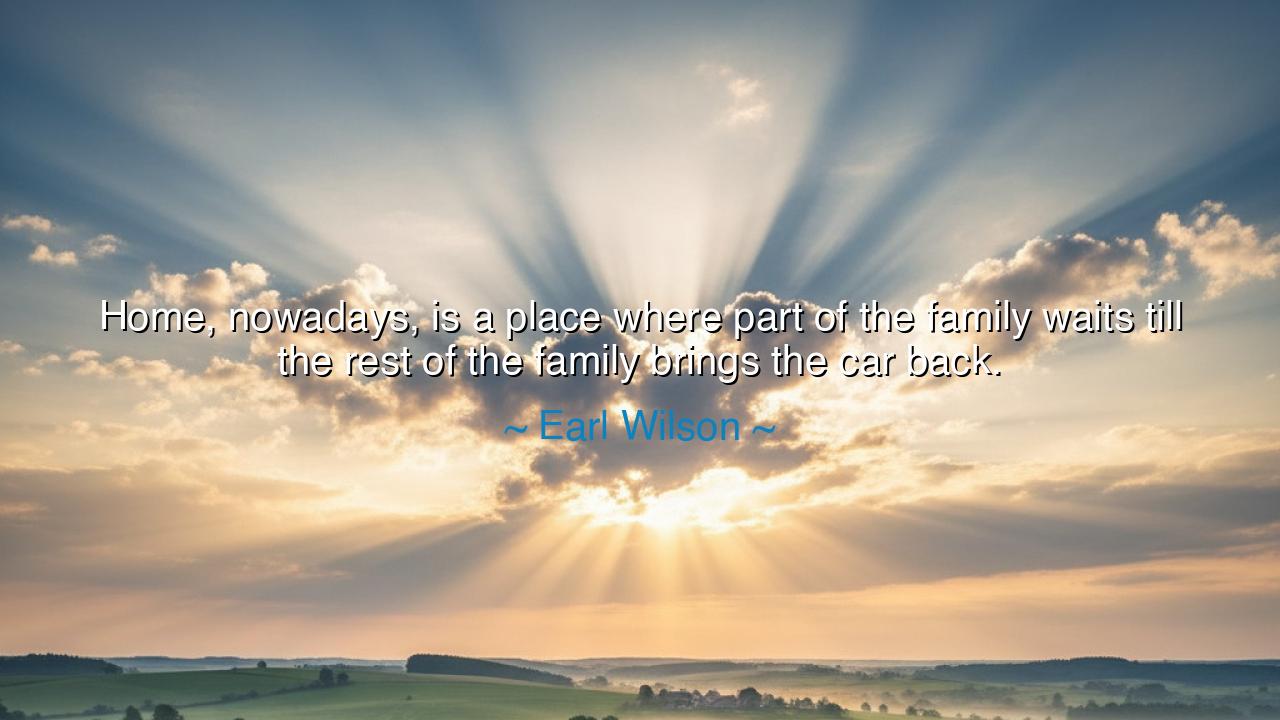
Home, nowadays, is a place where part of the family waits till
Home, nowadays, is a place where part of the family waits till the rest of the family brings the car back.






"Home, nowadays, is a place where part of the family waits till the rest of the family brings the car back." — thus observed Earl Wilson, with wit sharp enough to pierce the heart of modern life. Beneath this humor lies a lament for what has been lost — the sacred unity of the home, once the hearth of togetherness, now reduced to a station of comings and goings. His jest carries sorrow in its laughter, for it tells of an age where convenience has replaced communion, and the hum of engines has drowned the quiet song of shared time. The car, that symbol of motion and freedom, has become also a sign of separation — for in its wheels we see a family divided by haste.
The meaning of this quote reaches beyond mere commentary on the automobile. It speaks of how modern life, in its pursuit of speed and independence, has pulled the family away from the fireside and scattered it across the roads of busyness. Where once the home was a sanctuary, now it has become a transit point — a place of brief rest between errands, a roof under which members pass like travelers at a station. In Wilson’s era, and even more in ours, people began to measure time not by conversations shared, but by schedules met. His words remind us that the soul of the home is not its walls, but its togetherness — and that no convenience, no progress, can replace the warmth that blooms only when loved ones dwell not merely under one roof, but in one spirit.
The origin of Wilson’s words lies in the mid-20th century, a time when America was swept by the tide of modern prosperity. The automobile, once a luxury, became a necessity. Roads stretched like arteries across the nation, and the freedom of travel became a new creed. Yet this newfound mobility came at a cost. Families, once bound by shared evenings and mutual dependence, began to drift — parents to work, children to activities, each life spinning in its own orbit. Wilson, a humorist and columnist known for his sharp social observations, saw this transformation and cloaked his sorrow in laughter. His quote is both jest and elegy — a gentle mockery of progress that costs us our peace.
History shows us that this is not a new tale. The Industrial Revolution brought similar change. In earlier centuries, the family worked together — the blacksmith’s forge, the farmer’s field, the tailor’s shop were all extensions of home. Labor was not something that tore families apart but wove them together. Yet as machines rose and cities grew, work left the home, and the family followed. Husbands went to factories, children to schools, wives to markets — and the unity that once defined domestic life began to fracture. Earl Wilson, speaking centuries later, saw that the same pattern continued, only now gilded with the symbols of progress: the car, the telephone, the television. He laughed, but beneath his laughter was the echo of loss.
The quote also warns us of the illusion of advancement. The car, the tool of movement, promised connection — to reach friends, to see the world, to live freely. Yet it also carried people away from their roots. Families began to move faster, but not closer. The road that leads outward can also lead away. Wilson’s observation is thus not merely about automobiles, but about distraction and disconnection, the restless spirit that forever seeks something beyond the horizon and forgets to cherish the hearth. He reminds us that progress without presence is emptiness — that the greatest luxury is not motion, but stillness shared with those we love.
To see the truth of his words, one need only look at the modern world. Many homes are filled with light, yet not with laughter; connected by devices, yet divided by silence. Families sit beneath the same roof, each lost in their own screen or schedule, waiting for one another to “bring the car back” — to return, perhaps not only in body, but in spirit. The car is no longer just a vehicle — it is a symbol of how far we have drifted from the center, how our desire for speed has outpaced our capacity for stillness. Wilson’s humor, though gentle, is a plea: to pause, to return, to rebuild what the engine has undone.
Let this then be the lesson: reclaim your home as a place of gathering, not merely of passing through. Do not let your life become a series of departures and returns without presence. The home must again be sacred — the space where hearts are nourished, where words are shared, where time slows enough for love to breathe. Put aside the noise, the haste, the endless motion. Sit with those who wait for you. Speak, listen, laugh, pray. For the car will always take you outward, but only love can bring you home.
And so, O listener, remember Earl Wilson’s quiet wisdom: every age invents its own distractions, but the heart of humanity remains the same. Do not let the wheels of progress roll over the soul of your family. For when the journeys of the day are done, and the roads fall silent beneath the moon, it is not motion but togetherness that gives life its meaning — the eternal home where the spirit rests, and love, patient and still, waits for your return.






AAdministratorAdministrator
Welcome, honored guests. Please leave a comment, we will respond soon